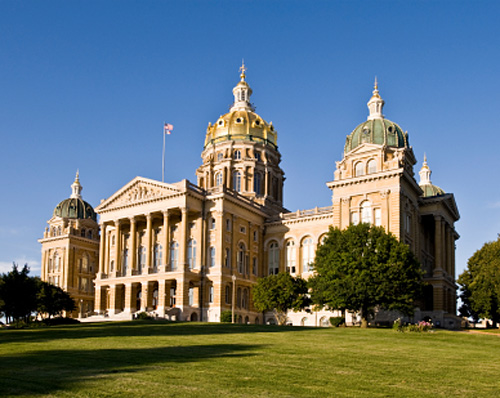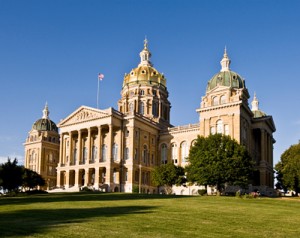There’s going to be a gas tax debate.
The outcome is uncertain, but lawmakers who see a need to raise revenue to address Iowa’s aging and deteriorating roads and bridges predict there will be bipartisan support for a phased increased equivalent to a 10-cent hike.
“I think it has legs,” Sen. Tim Kapucian, R-Keystone, ranking member of the Senate Transportation Committee, says about a plan loosely based on the recommendation of Gov. Terry Branstad’s Transportation 2020 Citizen Advisory Commission.
That panel recommended raising the registration fees for new vehicles from 5 percent to 6 percent – to make it the same as the state sales tax — and establishing a new user fee for hybrid vehicles. Those recommendations would generate between $184 million to $320 million in new yearly revenue for critical transportation needs.
According to the Department of Transportation, roughly $215 million is needed to address Iowa’s “critical” infrastructure needs and more than $1 billion would be needed to cover all the outstanding transportation projects, according to a state survey.
DOT officials project that each penny increase in the state fuel tax would bring in about $22 million in revenue and the 1 percentage point increase in vehicle registration fees was expected to generate $50 million in additional revenue.
While the gas tax debate may dominate the transportation agenda, lawmakers say there likely will be discussion of passenger rail funding and banning speed cameras.
“But I think our laser beam focus will be on a long-term plan to fix our roads and bridges, put people to work and improve safety,” said Senate Transportation Committee Chairman Tom Rielly, D-Oskaloosa.
There are likely to be competing plans. Sen. Matt McCoy, D-Des Moines, who chairs the Transportation, Infrastructure and Capitals Appropriation Subcommittee, expects bipartisan support in the House and Senate for a phased-in tax increase of 5 cents per gallon beginning Jan. 1, 2013, and another nickel increase on Jan. 1, 2014.
Key to lawmakers’ plans, of course, is whether Branstad would go along with a motor fuel increase. He maintains the state will generate enough revenue under the current plan to meet critical needs this year without a tax hike,
Down the road, however, he foresees a phased increase in the “highway user fee” to address a projected $200 million yearly shortfall.
Iowa currently gets $1.2 billion in yearly transportation money through the state’s road-use tax fund, which annually takes in $470 million from various vehicle-related fees and $430 million from fuel taxes currently set at 21 cents a gallon on sales of unleaded gasoline, 19 cents per gallon for ethanol-blended fuels and 22.5 cents a gallon for diesel, according to DOT data. Iowa’s gas tax was last raised in 1989 and currently ranks in the bottom third among states nationally, DOT officials noted.
There was support for a gas tax hike a few years ago, but legislators gave up when then-Gov. Chet Culver promised to veto any increase. Branstad has not threatened a veto and lawmakers say that while they don’t expect the governor to push for the tax increase, if it lands on his desk he will sign it.
Senate Majority Leader Mike Gronstal, D-Council Bluffs, withheld his full support for a gas tax hike, suggesting there’s no point spending political capital if Branstad’s not on board.
Whether legislators support a tax hike, he said, will depend on the situation in their district.
“It is a different issue in every district,” he said. In districts where roads are in good shape “they don’t really particularly see the need for it. So, I think there is going to be some that are for it, some that are against it.”
Tjepkes also predicts a spirited discussion about speed cameras with the possibilities ranging from simply establishing parameters for their use to an outright ban. A former member of the Iowa State Patrol, Tjepkes favors guidelines on when and how the cameras are used. He wants motorists to know where they are and how they can challenge citations issued based on the cameras.
There’s also support for requiring cities to forward the revenue from the cameras to the state road use tax fund to be redistributed through the Road Use Tax Formula as a way to address public concerns the devices are being installed for revenue rather than safety reasons.
Another proposal is to require cities to dedicate the revenue to roads and streets, Kapucian said. Lawmakers might be sensitive to local decision-making, he added, by letting cities decide whether to put it into streets or, perhaps, law enforcement.
Others, including Rep. Walt Rogers, R-Cedar Falls, want to ban the cameras.
“I understand the concerns,” Kapucian said, “but I do know what it has done on (Interstate) 380 in Cedar Rapids. It’s made it drivable again.”
State participation in developing a passenger rail link from Iowa City to Chicago is likely to get some attention. However, Gronstal doesn’t have much hope of finding support for state funding for the project.
“I think it’s highly unlikely that the House is going to take anything up on this subject,” he said. In 2011, the House wanted to strip funding for the project from the budget. “If people want this, they’re going to have to find a way to move some people in the House.”
The governor’s office suggests that there’s no need for a decision on funding in the 2012 session.








